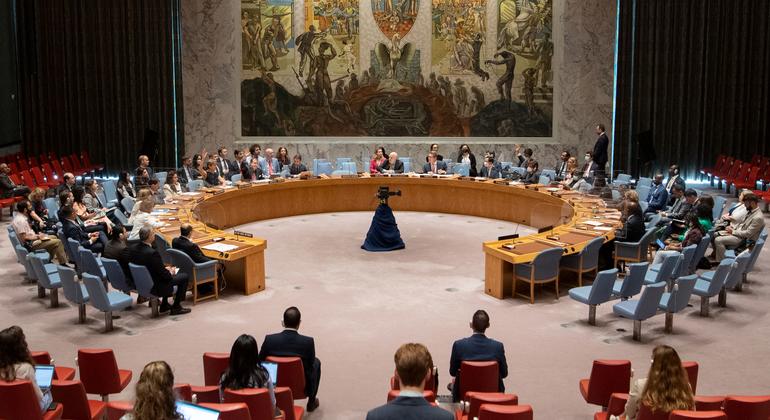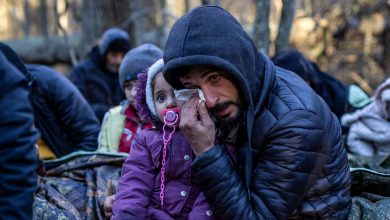Syria: Security Council extends cross-border aid for six months |

Ireland and Norway introduced a resolution extending humanitarian deliveries through the Bab-al Hawa border crossing to the end of January and calling for an extension of six months, which would require a different solution.
Twelve countries voted in favor, while three – France, the United Kingdom and the United States – abstained.
Demands are at a record level
Humanitarian needs in Syria are at their highest level since the start of the conflict more than a decade ago.
The cross-border mechanism has been around since 2014 and the most recent authorization, from July 2021, expired on Sunday.
Last month, UN Secretary General António Guterres called on the Council to extend its activities for 12 months, stressing the “moral imperative” in addressing the suffering of more than four million people in the region.
‘A difficult negotiation’
The extension comes after ambassadors rejected two competing resolutions on Friday.
The first draft presented by Ireland and Norway was vetoed by Russia. The latter, presented by Russia, is supported only by it and by China.
“It’s no secret that this is a tough negotiation,” Ireland Ambassador Geraldine Byrne Nason said, speaking ahead of Tuesday’s vote.
“We recognize that the six-month extension is shorter than we would have liked when we started this negotiation. We also recognize that the vast majority of the Council shares that view, and that of actual humanitarians, that a 12-month mandate is needed. ”
The Norwegian Ambassador, Mona Juul, spoke after the adoption of Resolution 2642 keeping the cross-border mechanism open.
“For those in humanitarian need in Northwest Syria, who are in an uncertain situation with negotiations going on outside of hours, we can assure them – and that is important. . Cross-border activity was their lifeline and today, cross-border activity is still there,” she said.
A ‘precarious innovation’
Ambassador Nicolas de Rivière of France praised the efforts of Ireland and Norway to reach a compromise. However, his country refused to support “this precarious innovation” as six months expire in winter, when aid is most needed and there is no firm guarantee of its continuation.
“The call by the Secretary-General and the entire humanitarian community to renew this mechanism in 12 months is very clear, and has been ignored,” he said.
Barbara Woodward, Ambassador of the United Kingdom, reiterated the great humanitarian need in Syria. Of the 4.1 million people in the Northwest in need of aid, 2.4 million rely solely on cross-border mechanisms.
She warned that without confidence for at least 12 months, UN agencies and NGOs risk being caught up in a cycle of permanent pre-positioning and contingency planning. .
She told the Council: “The UK will continue to support the UN’s efforts to put in place a humanitarian response plan, but we will not be looking at providing any reconstruction assistance that is not available to us. There is no credible, substantive and well-conducted political process.
Accelerated Diagonal Distribution
Ambassador Dai Bing of China welcomed the resolution, noting that it is normal for Council members to have different views and that sometimes these differences “can be obvious”.
He stressed that humanitarian assistance to Syria must respect the country’s sovereignty and the Syrian government’s ownership of the process.
Dai, China’s deputy permanent representative to the United Nations, said: “Transportation should become the main channel for humanitarian assistance to Syria.
“Cross-border delivery is a temporary arrangement made under specific circumstances. There is a need to accelerate the transition to cross-border relief and establish a clear timetable for ultimately defining cross-border relief.”
Ambassador Dmitry Polyansky told the Council that Russia will continue to monitor progress on the implementation of the resolution in an effort to decide the final fate of the cross-border mechanism.
“We believe that only through frank and substantive dialogue on the issues of the Syrian humanitarian line, with the participation of all relevant parties, will we be able to come to a decision. considered over a six-month period,” he said.
Mr. Polyansky added that the Council must now work on many important areas, including increasing the delivery of transnational aid in all areas of Syria, and lifting unilateral sanctions against the country. this in context COVID-19 pandemic.
For Ambassador Richard Mills of the United States, the vote revealed what happens “when one Council member holds the entire Security Council hostage.”
The resolution has resulted in cuts to humanitarian aid, which will only hurt the Syrian people, he said.
“Some of the recent severe needs in Syria are a direct result of Russia’s invasion of Ukraine, and the shock the brutal invasion has had on food systems in Syria and around the world. And the simple truth is that Russia doesn’t care,” said Mr. Mills, the country’s deputy permanent representative.
“Russia is shameless in disregarding the lives of Syrians to the point where it doesn’t even bother trying to justify its position on humanitarian grounds. This is an immoral and cynical approach to humanitarian needs”.






